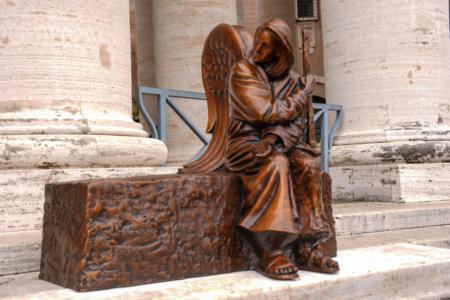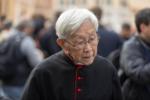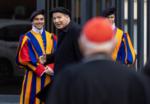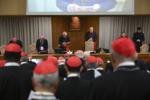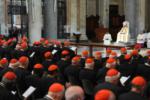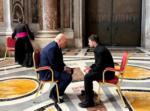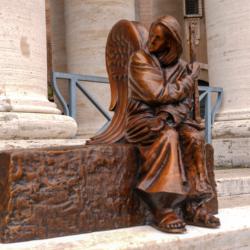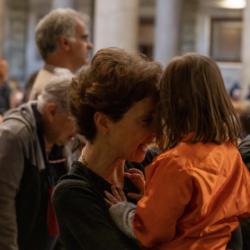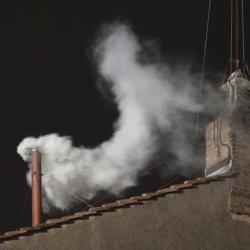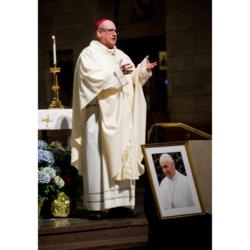The trouble about Christmas
Christmas is and always has been celebrated primarily in families and parishes. Parishes will celebrate Christmas now as they ever have. So the main upshot of the secularization of Christmas in the public square is that the family has to take more of an initiative.
Secularization is a given: we are stuck with "winter holidays" and "25 days of shopping" for the foreseeable future. No campaigns to say "Merry Christmas" can reverse that. Families must therefore supply on their own the celebration which children once might have imbibed effortlessly from public culture.
What this principally means for parents is more work. Let us be clear about that and accept the burden. Who is our best model for the preparation for Christmas? Some say Mary, pregnant, and awaiting the birth of the child she carries within. Others have said the wise men who began their long journey of homage. I say St. Joseph, who packed up a household and led Mary, with child, on an arduous journey to Bethlehem. St. Joseph models the main virtues now required of a Christian parent for Christmas: diligence, planning, perseverance, and hard work.
The main problem with the commercialization of Christmas, from this point of view, is not that it is "materialistic," but simply that it siphons away needed time and energy. For prudent Catholic parents, Christmas gift-giving presents no difficulty of greed or excess. They save up necessary purchases for the Christmas season. Always it is better to turn a necessity into a gift. Thus, clothing and other useful items which might have been bought as a matter of course during the year instead are transformed into special presents from "Santa" or other family members.
Moreover, shopping can be sanctified. For men especially trips to the store for Christmas gifts may be irksome: thus such trips are something to "offer up," perhaps for the particular intentions of the very persons for whom one is buying the gifts. It would be foolish to look for mortifications far afield in this "minor penitential season" of Advent when shopping provides many near at hand. There are some who, if only they shopped cheerfully and promptly, would be saints.
Husband and wife should confer near the beginning of Advent and decide deliberately how they will prepare for Christmas in their household. Since Advent is four weeks long, as in Lent perseverance becomes a highly important virtue.
Suppose they decide that every evening around the dinner table they will light the candles on an Advent wreath, read the verse from an Advent calendar to their children, and maybe conclude dinner by singing a verse from the hymn "O Come O Come Emmanuel." It is easy to do this once but exceedingly difficult to carry it off consistently for four weeks. (Or course they have to take pains to get the wreath and calendar in advance.)
Many families practice the tradition of a "secret Santa." You select the name of a family member pulled from a hat and devote yourself to doing special favors for that person throughout the Advent season. Or in some families the parents keep a "book of good deeds" where specific favors done by each family member towards others are recorded. We are all great "secret Santas" for a day or two, but children especially will need to be encouraged consistently throughout Advent and instructed in thoughtfulness.
The old traditions have it that Advent is a time of preparation for a three-fold reception of the Messiah, past, present and future. We participate in memory in the birth of the Christ child into the world (past). We anticipate in expectation the coming again of the Lord at the end of time (future). We prepare here and now for the reception of the Holy Child into our hearts (present). Of these, the present is surely the most important, because we live in the present, and in a sense only the present exists.
But the chief way of receiving Our Lord in the present is obviously in the Eucharist. Therefore, the most appropriate practice which any Catholic could adopt in preparation for Christmas would be frequent, and if possible daily, reception of the Eucharist. One wonders why many Catholics adopt daily Mass attendance for Lent but not for Advent, where such a practice seems even more fitting.
From the point of view of the Catholic family, a parent who attends daily Mass in Advent lays a solid spiritual foundation for everyone else. This "secret" reception of the Lord will bring down graces upon the whole family.
Children can be encouraged in analogous spiritual preparations. What about an evening family Rosary -- perhaps only a decade for smaller children? Parents can read aloud and discuss the Bible verses which the Church chooses for Advent. These are easily found online at www.USCCB.org, the web site of the U.S. Conference of Catholic Bishops. Also, since nowadays Christmas carols will not be taught or sung in most schools, families might learn them -- and memorize the lyrics -- on their own. Not "Rudolph the Red-nose Reindeer," but "Silent Night" and "While Shepherds Watched Their Flocks by Night."
Likewise celebrate St. Nicholas' Day (Dec. 6) and the Immaculate Conception (Dec. 8), feast days which fall in Advent by the wisdom of God and are designed to help us prepare for Christmas.
Finally, get a fresh Christmas tree, which you can keep up all the way through to Epiphany, since Christmas merely starts on Christmas Day.
Michael Pakaluk is Professor of Philosophy at Ave Maria University.
